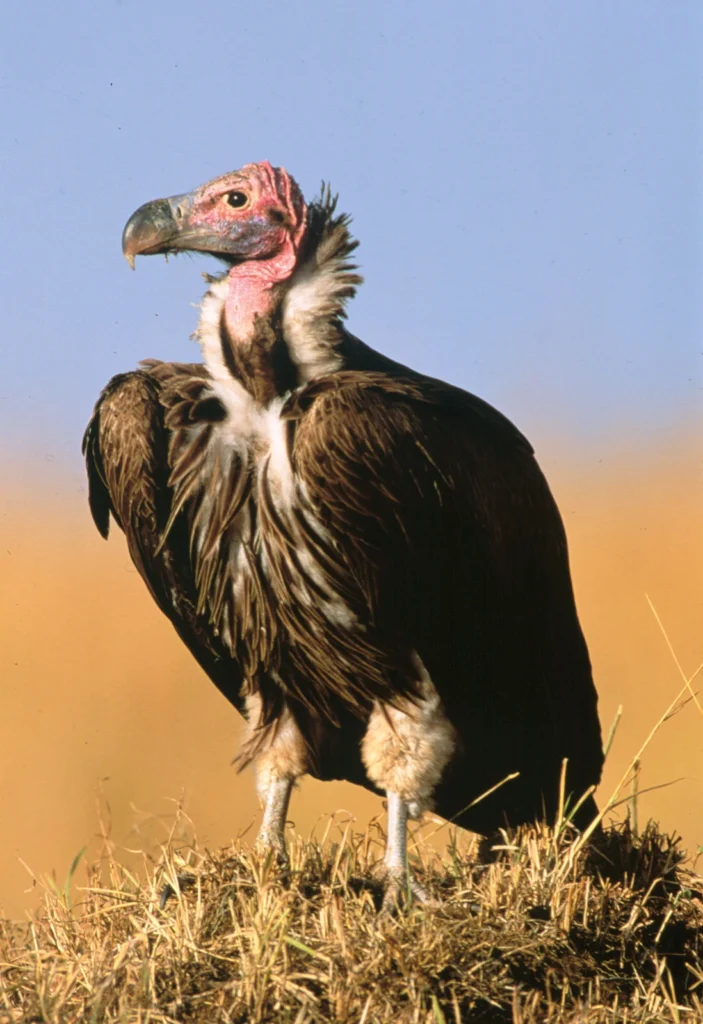
Embarking on a safari with Future African Safari offers more than just the chance to witness Africa’s iconic big game; it also presents the opportunity to marvel at some of the continent’s most magnificent and vital avian species. Among these, the Lappet-Faced Vulture stands out as a symbol of strength, grace, and ecological importance. Known for their impressive size and striking appearance, Lappet-Faced Vultures are a must-see for bird enthusiasts and nature lovers alike. Join us as we explore the fascinating world of the Lappet-Faced Vulture in Tanzania and discover why encountering this majestic bird should be a highlight of your safari adventure.

Meet the Lappet-Faced Vulture: Africa’s Aerial Guardian
The Lappet-Faced Vulture (Torgos tracheliotos) is one of Africa’s largest and most powerful vultures, renowned for its distinctive appearance and crucial role in the ecosystem. With a wingspan that can reach up to 2.3 meters (7.5 feet), these impressive birds soar high above the savannahs and woodlands of Tanzania, acting as nature’s cleanup crew by scavenging carrion and preventing the spread of disease.
- Striking Appearance: The Lappet-Faced Vulture is easily recognizable by its large, bald head adorned with prominent skin flaps called lappets. These lappets help keep dirt and feathers away while feeding and serve as a thermal regulator.
- Powerful Build: These vultures have robust bodies and strong wings, allowing them to glide effortlessly over vast distances in search of food. Their deep, resonant calls can be heard over long distances, signaling their presence to other scavengers.
Habitat and Distribution in Tanzania
Lappet-Faced Vultures thrive in a variety of habitats across Tanzania, each offering the ideal conditions for their scavenging lifestyle:
- Savannahs and Grasslands: Open landscapes with scattered trees provide ample opportunities for spotting these vultures as they glide above the plains, scanning the ground for carrion.
- Woodlands and Acacia Forests: Dense vegetation offers both hunting grounds and nesting sites, allowing vultures to find food and shelter in abundance.
- National Parks and Reserves: Parks like Serengeti, Tarangire, and Ruaha are prime habitats for Lappet-Faced Vultures, where conservation efforts help maintain healthy populations and protect their natural environments.
Behavior and Feeding Habits
Lappet-Faced Vultures play a vital role in Tanzania’s ecosystems through their scavenging behaviors:
- Scavengers Extraordinaire: These vultures primarily feed on carrion, cleaning up dead animals and preventing the spread of diseases. Their strong beaks and stomach acids are capable of breaking down tough carcasses, including bones.
- Social Flyers: While they can be seen alone, Lappet-Faced Vultures often travel in loose flocks, especially when searching for food. Their soaring flights are not only energy-efficient but also allow them to cover large areas quickly.
- Nesting and Breeding: These vultures nest in large trees or on cliffs, building substantial stick nests that can accommodate multiple eggs. Both parents take part in incubating the eggs and feeding the chicks, ensuring the next generation of vultures thrives.
Conservation Status and Efforts
The Lappet-Faced Vulture is currently listed as Vulnerable by the IUCN, facing several threats that could impact their populations:
- Poisoning: Accidental poisoning from ingesting carcasses of animals treated with poisons intended for predators is a significant threat. Conservation efforts focus on reducing the use of poisons and promoting safer alternatives.
- Habitat Loss: Expansion of agriculture, urbanization, and infrastructure development encroach upon their natural habitats, reducing available feeding and nesting sites.
- Human-Wildlife Conflict: Misunderstandings and negative perceptions of vultures can lead to deliberate killings, further endangering their populations.
Tanzania is actively involved in conservation initiatives to protect Lappet-Faced Vultures:
- Protected Areas: National parks and reserves provide safe habitats where vultures can live and scavenge without significant human interference.
- Anti-Poisoning Campaigns: Efforts to educate farmers and communities about the dangers of poisoning and promoting wildlife-friendly practices help reduce accidental and intentional poisonings.
- Research and Monitoring: Ongoing research projects track vulture populations, health, and breeding success, providing valuable data to inform effective conservation strategies.
Tips for Spotting Lappet-Faced Vultures on Safari
Encountering a Lappet-Faced Vulture can be a breathtaking addition to your safari experience. Here are some tips to enhance your chances of spotting these magnificent birds:
- Choose the Right Parks: Serengeti, Tarangire, and Ruaha National Parks are excellent locations for observing Lappet-Faced Vultures, thanks to their suitable habitats and abundant carrion.
- Optimal Timing: Early morning and late afternoon game drives offer the best opportunities to see vultures as they are most active during these cooler parts of the day.
- Look for Soaring Flights: Keep an eye on the skies for large, soaring birds gliding effortlessly above the landscape. Their distinctive silhouette and soaring patterns are hard to miss.
- Guided Tours: Experienced safari guides know the best spots and times for vulture sightings, enhancing your chances of a successful encounter.
- Be Patient and Observant: Vultures can be seen perching on tall trees, cliffs, or even following large herds of herbivores, so stay alert and patient to catch glimpses of these aerial guardians.
Experience the Majesty of Lappet-Faced Vultures with Future African Safari
Encountering Lappet-Faced Vultures on your Tanzanian safari is not only a testament to your adventurous spirit but also a contribution to their conservation. At Future African Safari, we are dedicated to providing responsible and unforgettable safari experiences that bring you closer to Tanzania’s most vital and magnificent wildlife. Our expert guides, personalized itineraries, and commitment to conservation ensure that your adventure is both thrilling and meaningful.
Ready to soar with Tanzania’s majestic Lappet-Faced Vultures? Contact Future African Safari today to customize your Tanzanian safari and embark on an adventure that celebrates the beauty and ecological significance of Africa’s sky sentinels.
Explore more about our safari packages and discover the best of Tanzania with Future African Safari. Your unforgettable African adventure starts here!

